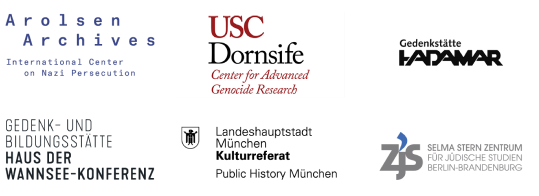Annotations
Munich
November 1941
Women, men, and a boy in front of pieces of luggage after their arrival at the Milbertshofen camp. The Jewish star is visible on a coat trimmed with a fur collar worn by one of the women. A barracks can be seen in the background.
Annotations
People
1
Keywords
7
Historical context
Deportation von München nach Kaunas am 20.11.1941
On November 20, 1941, the Munich Stapoleitstelle (state police headquarters) organized the deportation of almost 1,000 Jews from Munich and Augsburg to Wehrmacht-occupied Kaunas in Lithuania. The transport was originally scheduled to leave for Riga a few days earlier. Since the ghetto in Riga was overcrowded, the Reichssicherheitshauptamt (Reich Main Security Office) in Berlin changed the destination at short notice. Most of the people who were deported on this first transport from Munich were young people and families. In Kaunas, they were sent to Fort IX, where the SS, supported by Lithuanian auxiliary troops, shot them on November 25, 1941, just one day after their arrival.
About the image series
The ten photos are pasted into a typewritten manuscript titled “Zur Geschichte der Juden in München” (On the History of the Jews in Munich) written by Michael Meister. The pictures are historical prints. The person who took the photos is unknown, as are the whereabouts of the negatives. Due to the fact that the photos were glued onto the page, the backs of the photos cannot be viewed. The manuscript includes short captions below the photos.
The picture series contains photographs that show Jews arriving at the Milbertshofen assembly camp prior to the deportation to Kaunas on November 20, 1941, the luggage they were carrying, their personal details being checked, and their accommodation in barracks.
Photographer
Unknown,
Provenance
The manuscript is in the part of Michael Meister’s (1908 - 1992) estate given to Stadtarchiv München by his descendants in 2000.
A municipal official since 1936, Michael Meister was involved, among other things, in the “Arbeitskreis für Judenangelegenheiten” (Working Group for Jewish Matters), where Munichs’s various administrative offices decided on the "Aryanization" of Jewish businesses. He was also in contact with the Munich-based “Forschungsabteilung zur Judenfrage” (Research Department on the Jewish Question), part of the “Reichsinstitut für die Geschichte des neuen Deutschlands” (Reich Institute for the History of the new Germany).
The surviving manuscript is an academic text covering the period from the first accounts of Jews settling in Munich until the almost complete extinction of the Jewish community in 1945. The diction and the interpretation of the sources used reflect a clearly antisemitic attitude.
Call number at source archive
DE-1992-FS-NS-00022
Title at source archive
Sammellager Milbertshofen; Aufnahme aus dem Nachlass Meister
Acknowledgements
It is thanks to the journalist Matthias Reiser that the manuscript with this important photographic evidence was handed over to Stadtarchiv München.
The present description is based on the study by Elisabeth Angermair, Letzte Station Milbertshofen. Fotografische Zeugnisse der Deportation und ihre Überlieferung, in: Stadtarchiv München (ed.): “... verzogen, unbekannt wohin”. Die erste Deportation von Münchner Juden im November 1941, Munich 2000.
Text and research by Maximilian Strnad, Elisabeth Angermair und Eva Tyrell.
Kooperationsverbund #LastSeen. Bilder der NS-Deportationen Dr. Alina Bothe Projektleiterin
c/o Selma Stern Zentrum für Jüdische Studien Berlin-Brandenburg
Freie Universität Berlin
Habelschwerdter Allee 34A
14195 Berlin
lastseen@zedat.fu-berlin.de
Ein Kooperationsprojekt von

Gefördert durch

Datenschutz | Impressum